4 Reasons Why Open Water Requires The Strongest Mind
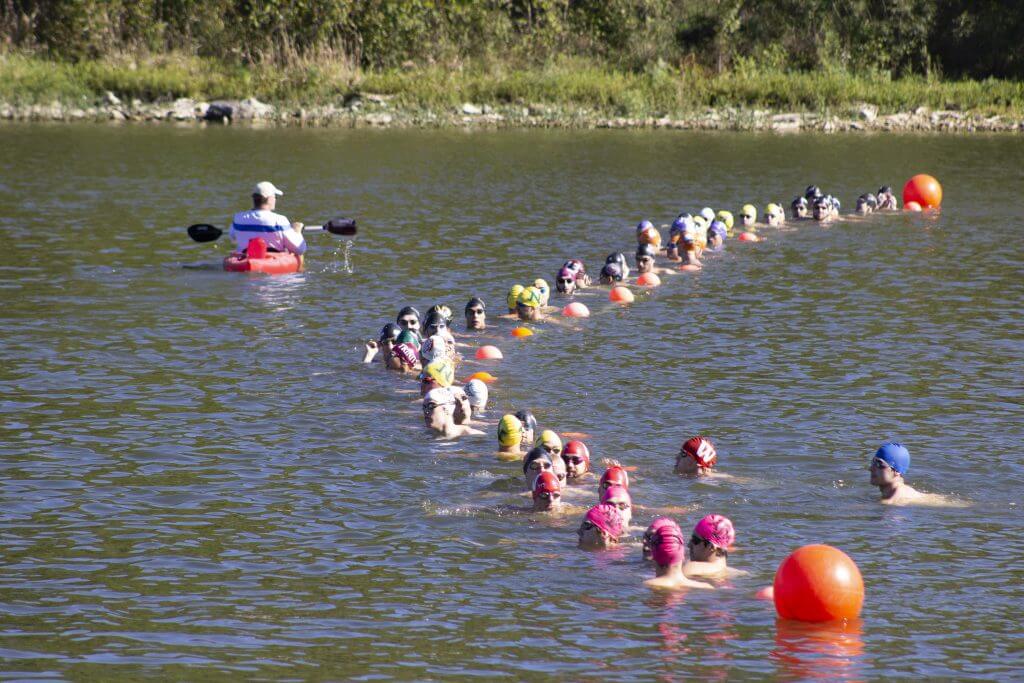
By Ryan Gibbons, Swimming World College Intern.
It comes with little debate among the swimming community that swimmers are among the toughest athletes across the board both physically and mentally. The countless hours, hundreds of thousands of yards, and early mornings put in – even just for a single season – render strength in every meaning of the word.
Yet, among this elite class of athletic grit lies the one group who take their mental and physical strength to the next level and whose emotional strength daunts most in the swimming world: those who take themselves early in the morning not to the pool but to their local lakes and rivers.
Though the numbers of open water swimmers throughout the world may be few, their mentalities stand above the rest. Here are four reasons why open water athletes are the mentally toughest group of athletes anyone will ever meet.
1. The Intense Distance
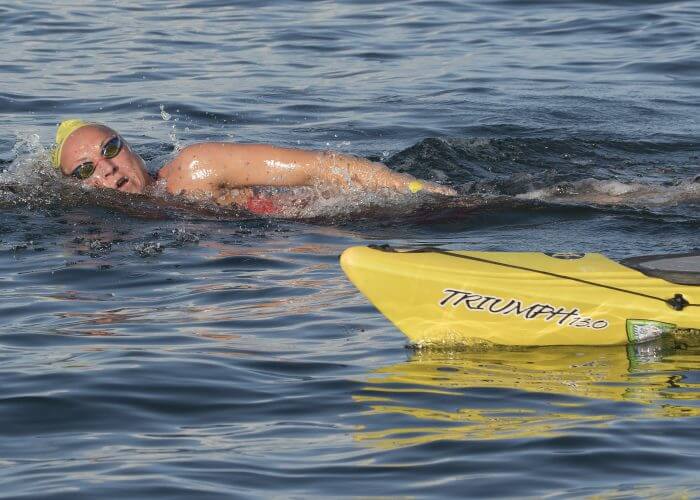
Photo Courtesy: Bob Care
Any swimmer who has ever swum the 1,650 or 1,500 can speak to the grim and daunting sense of fear behind the blocks – few athletes have to mentally prepare themselves for such a long race. For open water, the shortest recognized national event – the 5K – is over three consecutive miles.
To prepare oneself not only for such a daunting race but also to maintain that mental strength and endurance for over an hour at nonstop aerobic threshold requires intense concentration and determination. By no means do these swimmers numb the pain or push it aside; rather, throughout and before their races, they are tough enough to handle it and turn it in to strength.
2. The Isolation
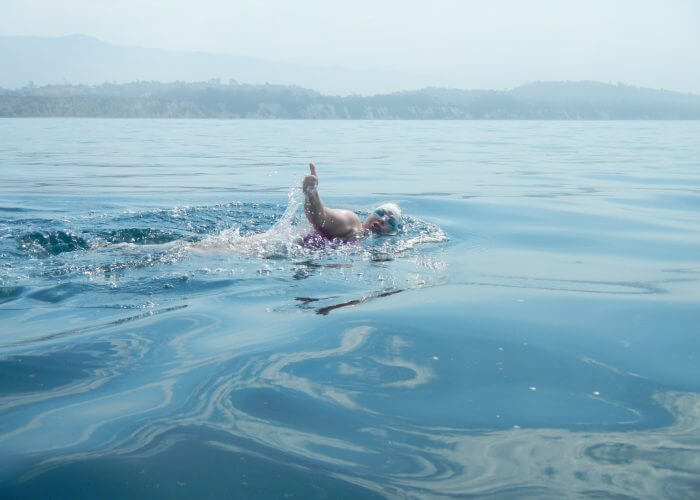
Photo Courtesy: Robyn Beresh
This becomes a more obscure aspect of open water but a daunting one nonetheless. As any coach will testify, swimmers are generally social, talkative people. In open water, an athlete is isolated with their thoughts for the entire duration of the race. From entering the water to stopping the clock, an athlete does not talk, cannot hear anything but the water, and sees little but buoys. Being alone for such a great period of time, especially while in intense physical work, is incredibly taxing – it takes a truly tough individual to neutralize this aspect.
3. The Strategy
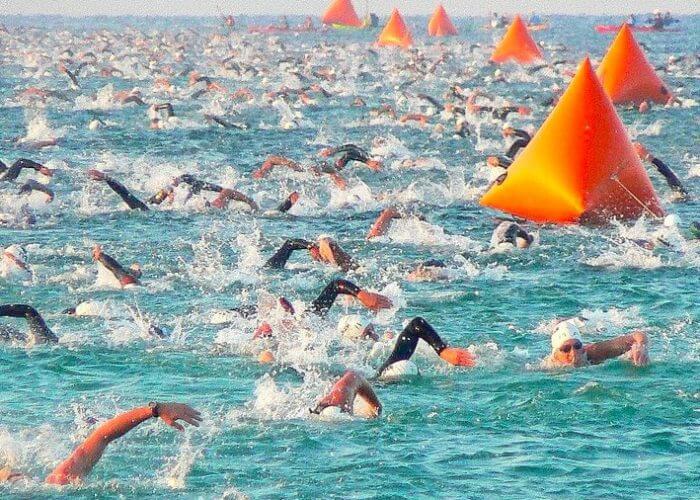
Photo Courtesy: TriSports University
Possibly open water’s greatest difference from regular swimming lies in the group nature of the sport: wherein ‘pool’ swimming is simply separated lanes, marked lines, and straight-line swimming, open water removes all of this. Swimmers are forced to work either together or against each other – as minimal contact is allowed (a huge contrast to regular swimming), swimmers must fight to get ahead and stay ahead. Knowing how to draft, cut others out, and position oneself for turns around buoys is vital.
For open water swimmers, they are forced to navigate on their own, ‘sighting’ their way from buoy to buoy instead of following a straight line. Open water coach Don Henshaw says that “staying focused on the race and the course” is one of the most challenging aspects of the race mentality, yet it is arguably the most important. Poor navigation skills can ruin a race – strategic skills can win one.
These numerous strategic aspects of the race mean that absolute focus is necessary. While “zoning out” can be advantageous in distance pool swimming, in open water, anything less than complete focus can spell disaster.
4. The Surroundings
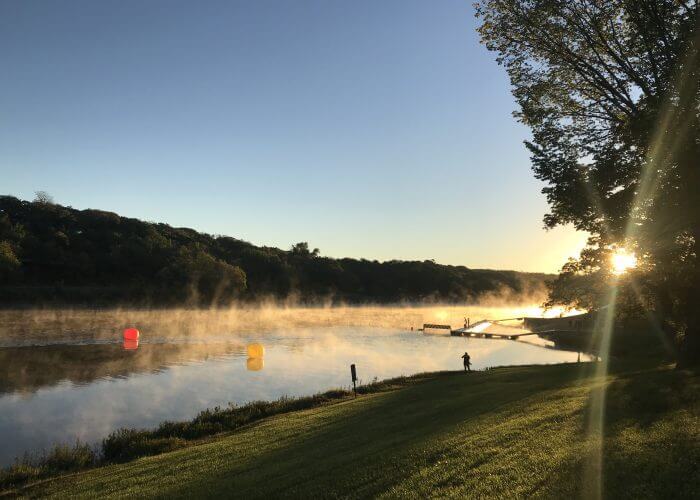
Photo Courtesy: Missouri Swimming and Diving
Any swimmer behind the blocks knows what they’ll face: a generally regulated temperature, smooth water and minimal interference. In open water, the temperature can range greatly, the water can go from glass smooth to whitecaps, and wind or currents can blow swimmers off course.
Open water swimming requires interaction with the natural surroundings. A swimmer who cannot adjust to these conditions will not be successful in open water; they must be able to use whatever conditions they are given to their advantage. Whether it means altering their stroke, changing their strategy, or simply gritting their teeth to get through it, flexibility of mindset is key.
Likewise, there’s an inherent fear of open water: diving headfirst into a pit of unknown is anything but comfortable. Not being able to see the bottom, thinking of sharing one’s lane with the creatures of the wild, and being cast far from shore takes true mental toughness to overcome.
Open water swimmers are the top of the line. It takes nothing less than mental grit and determination to become successful in the field. For those who either have this strength or are willing to develop it, this lesser-known aspect of swimming is an exciting, incredible feat of athletic strength. Is open water swimming your calling?
All commentaries are the opinion of the author and do not necessarily reflect the views of Swimming World Magazine nor its staff.




Janet !
Giovanni Gutierrez
Ricardo Palomino A.K.A. El jefe máximo. Leí este artículo, me acordé mucho de ti, e hizo que te admirara aún más amigo. Grande!
Gracias hermano! Tu también eres de los grandes ?? yo opino que no deberías de dejar este maravilloso deporte
Ricardo Palomino Muchas gracias por tus palabras viejo! Lo seguiré haciendo el resto de mi vida; simplemente nuevos desafíos me obligan a dejar a un lado el mundo competitivo. Aunque siempre queda una última vez para despedirse…
Nunca es tarde para un último esfuerzo…
aún así tendrás éxito en todo lo que te propongas hermano! ??
Ricardo Palomino Así es mi estimado! Muchas gracias hermano; ni qué decir de ti cauwn. Nos estamos viendo y seguimos en comunicación. Un abrazo!
Lauren Waldenfor Wodapalooza ?
Blaik Ogle
I would disagree. This makes it sound like so much more work than it is! Swimming is fun. Open water is a chance to explore and turn your brain off – that’s the beauty of it. I’ve never felt alone or isolated in open water – I’ve felt sensory deprived in a pool. I see pool swimmers as the overthinkers, over achievers, focused on every detail, tough as nails. Open water guys are more “oh that place looks cool – let’s go swim it. It’s cold? Better eat some pizza.”
Blaik Ogle, what you do amazes me!!!
Jaclyn Kile ditto ?
Sami Coates
Kathy Hartman
Love open water swimming. Don’t have to do all those stupid flip turns.
Nate Dicken
Chloe Green
Nicholas Rollo Will Rollo
Carli Cheatham
Daniel Morris
Marny Doig